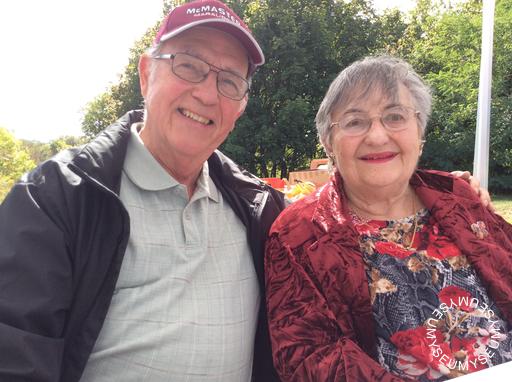Submitted by Ron on Sep, 27
Ron & Olive: Pioneers in Education and Science
Ron: I was in science and engineering for a while, but then I got involved in the teaching business. Olive has a much more interesting career.
Olive: I was a lab technologist and I did research work in health sciences. I got into a very interesting part of it when radioisotopes were just being developed. In the research I did, I used radioactive isotopes and it took me down to Washington DC. It was a good opportunity. I worked in two different hospitals there but eventually I wanted to come back to Canada. When we got here, at McMaster, they were developing a reactor and that was very interesting. They were able to bring in a hospital and that's when I came back to Hamilton. I got in at the very beginning before they had any education for it. They taught lab work very well there. They established the society for laboratory technology at the General. That's where I trained.
When I was there, I was valuable because I knew how to do it.
Working in Washington in the 1950s I was just a young woman but it was very exciting.
Ron: Olive was part of one of the first big medical articles out of McMaster.
Olive: When I was in Washington they had a $75,000 insurance policy for me in case of the radioactivity, if it got to me. That was a lot of money then. I was never fearful of it at all though. You learned to work with these things.
It was amazing to be at the very beginning of something, where we were really just figuring things out.
I have always been a knitter and lately at my church the guild has been doing some work there. One of the other women was very interested in the kind of stitch I was doing. It was a feather stitch. I showed it to them and they all thought it was wonderful! They'd never seen it before. It is a very old stitch.
Ron: We were down at the AGO and they got a day where she was demonstrating knitting to children. It was really fun.
Olive: Kids have such a fun visual sense. It's really wonderful. My generation learned during the war because in school you'd knit squares and put them together, so at any rate, now that another generation is picking up an old skill. I really like that.
How is this object or story important to you?
Olive: I was just coming out of grade thirteen and it was hard to find a job back then. My father had just died.
Ron: Her aspirations were to go to university. She was always very smart. Back then there was no safety mechanism like insurance. The family was in financial difficulty.
Olive: I was very interested in sciences. I was told about this course in Hamilton. It was only a year and a half. It was like a nursing program where you do everything. I thought it was interesting. Before the war all the lab work in hospitals was done by orderlies! There was no lab science. That began in Hamilton. Even when I went to the USA, there were no technologists who knew how to work in a lab
Ron: You were very fortunate to be able to get attached to a researcher when you were young.
Olive. I was at Western, working in a little hospital. It was a good job. The person I worked for got a job in Washington and he took me with him. Later he got involved in the space program. They use computers now to develop results—I used paper! I had to graph it out.
The skills that I learned, I still use them in cooking and so on.
What does it add to the story of Toronto?
Ron: We've always been very close to Toronto. It's a good place to go to expand. We go to the ROM. As we grew older, it's always been an entertainment centre for us. It's always been a part of our life.
Olive: While driving out here, I was amazed because as a teenager we lived out here. Now I'm like, where is it? It's changed so much.
Ron: I got to know Toronto from my teaching. I'm involved with the Ontario college of education. I was always coming down here.
